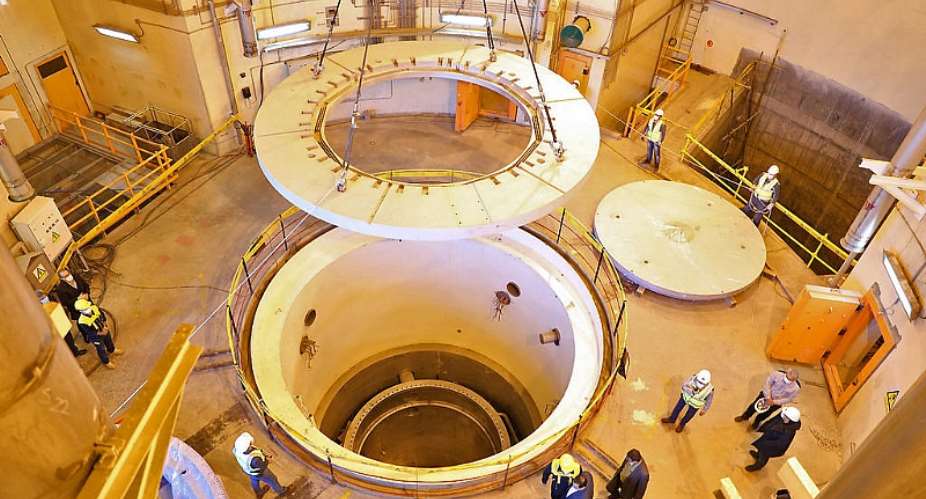Iran has started the process to enrich uranium to 20 percent purity at its underground Fordow facility, state media reported Monday, going well beyond the threshold set by the 2015 nuclear deal.
This is the latest and most important suspension of nuclear commitments agreed by Iran under the landmark Joint Comprehensive Plan of Action (JCPOA), signed in 2015.
Iran has gradually abandonned key provisions of the international deal in response to US President Donald Trump's dramatic withdrawal from the accord in May 2018, with the US subsequently imposing heavy economic sanctions on Tehran.
Head of the Atomic Energy Organisation of Iran (AEOI), Ali Akba Salehi, was quoted by the state-controlled Mehr news agency as saying that "we were able to achieve 20 percent uranium enrichment technically within 24 hours," adding that “until three or four years ago, we used to produce an average of 4 to 5 tons of yellowcake, but now, for about two years, we have increased the production of yellowcake to 30 tons," an amount that may grow to 40 tons, or an eight-fold increase compared to 2018. Yellowcake is concentrated uranium powder, and is an intermediate step in the processing of uranium ore.
'Considerable departure'
The European Union on Monday said that Iran's enrichment programme would be a "considerable departure" from the 2015 deal.
EU spokesman Peter Stano said Brussels would wait until a briefing from the director of the UN's IAEA nuclear watchdog later Monday before deciding what action to take.
Israel's Prime Minister Benjamin Netanyahu sees Iran's latest steps as a "proof" that Tehran wants to develop a nuclear weapon, something Iran has always denied.
On 31 December, Iran informed the International Atomic Energy Agency (IAEA), that it would begin producing uranium enriched to up to 20 percent purity, the level of enrichment before the nuclear deal was reached.
According to the latest IAEA report available, published in November, Tehran was previously enriching uranium to levels greater than the limit provided for in the 2015 Vienna agreement (3.67 percent) but not exceeding the 4.5 percent threshold, and still complied with the agency's strict inspection regime.
Assassination
But things changed follolwing the assassination in late November of Iranian nuclear physicist Mohsen Fakhrizadeh.
In the aftermath of the attack, blamed on Israel, hardliners in Tehran pledged a response and on 1 December, the conservative-dominated parliament passed a bill "for the lifting of sanctions and protection of the Iranian people's interests".
The bill also called for the production and storage of "at least 120 kilogrammes per year of 20 percent enriched uranium", and mandated the administration to end UN inspections of Iran's nuclear facilities, if the remaining parties to the deal -- Britain, China, France, Germany and Russia -- do not facilitate Iran's oil sales and guarantee the return of the proceeds.
Europe still in
Earlier, the EU had spoken in favor of maintaining the deal, in spite of the US unilateral withdrawal.
In a statement on 21 December, France, Germany and the UK “re-emphasised their commitment to preserve” the JCPOA and pointed at the “need to address … sanctions lifting commitments”.
All eyes are now on the US, where president-elect Joe Biden will take the helm in just two weeks. If it is up to France, the other European partners, China and Russia, the JCPOA may be restored, albeit with some modifications.





 Whoever participated in the plunder of the state must be held accountable – Jane...
Whoever participated in the plunder of the state must be held accountable – Jane...
 A vote for John and Jane is a vote to pull Ghana from the precipice of destructi...
A vote for John and Jane is a vote to pull Ghana from the precipice of destructi...
 I’ll repay your abiding confidence with loyalty, understanding and a devotion to...
I’ll repay your abiding confidence with loyalty, understanding and a devotion to...
 ‘I’ve learnt deeply useful lessons for the future' — Serwaa Amihere breaks silen...
‘I’ve learnt deeply useful lessons for the future' — Serwaa Amihere breaks silen...
 I’m sorry for the embarrassment – Serwaa Amihere apologises for leaked sex video
I’m sorry for the embarrassment – Serwaa Amihere apologises for leaked sex video
 Dumsor: Matthew Opoku Prempeh not in charge of Energy sector – Minority
Dumsor: Matthew Opoku Prempeh not in charge of Energy sector – Minority
 Adu Boahen’s murder: Police arrest house help who was in possession of deceased’...
Adu Boahen’s murder: Police arrest house help who was in possession of deceased’...
 Akufo-Addo nominates Felicia Attipoe as Tema West MCE
Akufo-Addo nominates Felicia Attipoe as Tema West MCE
 Election 2024: I can't have someone I defeated twice as my successor – Akufo-Add...
Election 2024: I can't have someone I defeated twice as my successor – Akufo-Add...
